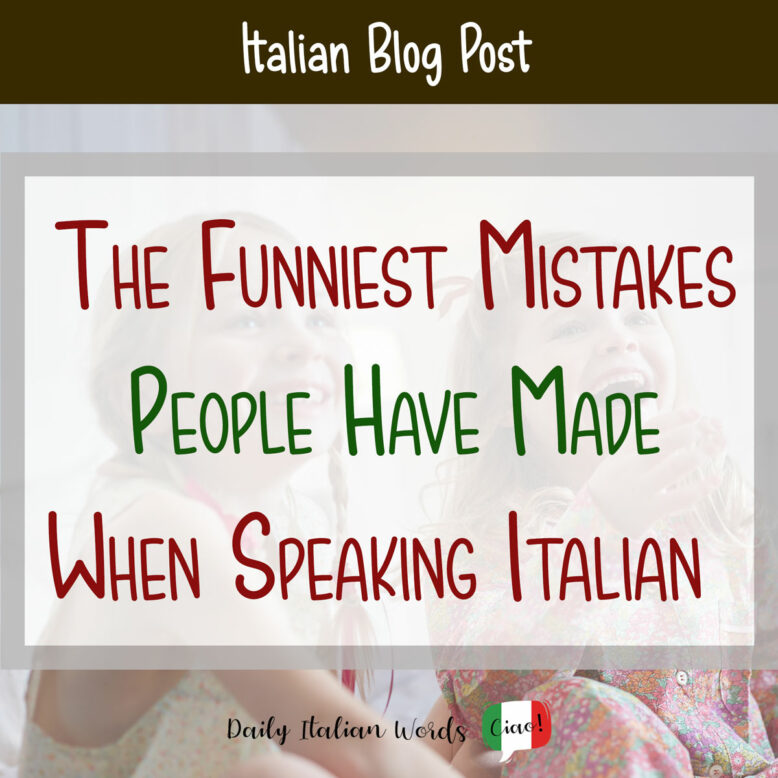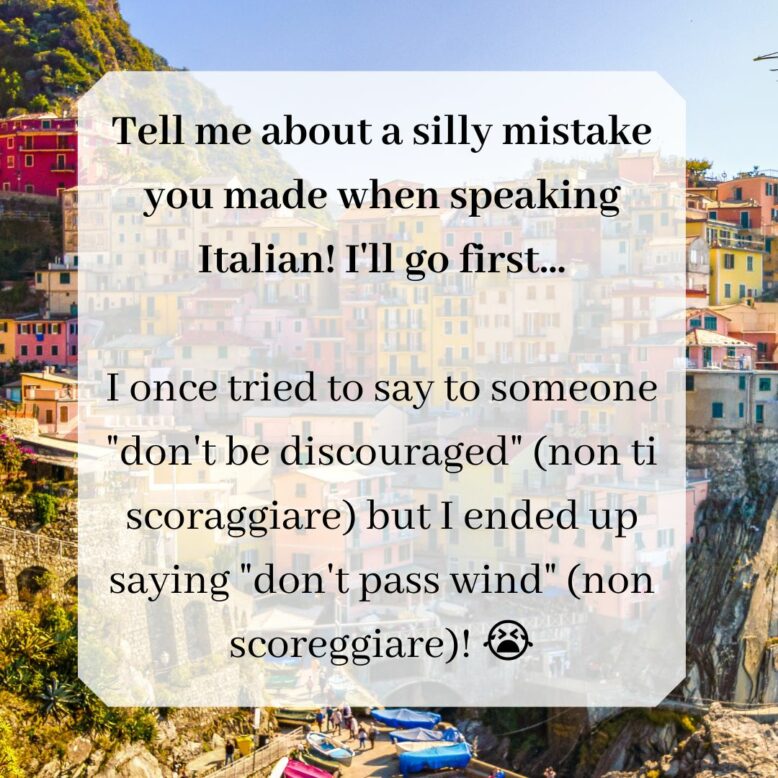Mistakes are an inevitable part of learning a new language, and they’re not only normal but also an integral aspect of the language acquisition journey. The more mistakes you make, the faster you will learn the correct way to say things.
Still, that doesn’t mean some of these mishaps aren’t downright hilarious. In this article, we showcase an array of the most comical slip-ups our readers have experienced while conversing in Italian with native speakers. Get ready to have a good laugh!

Disclaimer: These stories were obtained from a thread in our Facebook group and have been republished with the explicit consent of the authors. Minor edits to punctuation and grammar, and translations have been provided for clarity.
Is it masculine or feminine?
Italian is full of words that are identical except for the ending, which can be either masculine (generally ending in -o) or feminine (generally ending in -a). Countless readers shared anecdotes of mixing up such words, leading to rather embarrassing situations. For instance, confusing “tetto” (roof) with “tetta” (breast), “banco” (bench) with “banca” (bank), or “fico” (fig) with “fica” (a derogatory term for a women’s body part) has been the source of many humorous and awkward moments for Italian language learners.
I was trying to explain something about the roofs of the buildings to a friend and I used the word “le tette” instead of “gli tetti“! Very embarrassing!
– Mark S.
I kept calling a man signora (lady). It just slipped out…
– Anonymous
I wanted to say that we were making shoeboxes of stuff for the homeless…but instead of senzatetto I said tette. Much laughter all round!
– Teresa G.
I once asked if the benches (banchi) were open instead of the banks (banche)! There was only one vowel in it!
– Marina M.
Similar sound, completely different meaning
Even beyond the challenges of masculine and feminine endings, Italian can be tricky with its similar-sounding words. One of the most notorious examples reported by our readers is the confusion between “pesce” (fish) and “pesca” (peach). Indeed, many brave individuals admitted to mistakenly ordering a fish ice cream instead of a peach one!
I once walked into a bar and asked if I could use the loo (gabinetto), but I used the word ‘gabbiano‘ (seagull). Lots of strange confused looks from the bar staff, so obviously used lots of gestures to explain needing the loo, flushing the chain, etc. My Italian friends were killing themselves laughing.
– Joanne H.
I asked a young lady in Siena for fish gelato…I screwed up the word for peach (I said pesce instead of pesca). There worst part was, they didn’t even have peach. It was melon.
– Leigh S.
I wanted a ring at a jewelers and asked for an agnello (lamb) instead of anello (ring).
– Linda H.
I once said, “mangiamo carne” which came out …”mangiamo cane”! There were quite a few quizzical looks until I realized what I had said, laughed, and explained to them about a Boston accent!
– Christine F.
Watch out for those double consonants
In Italian, a word’s meaning can change simply by doubling a consonant. This can lead to some pretty embarrassing situations, especially if you’re dealing with close cousins like anno (year) and ano (anus)!
Ordering penne in a restaurant, I mistaking said the word too quickly and it came out as pene (male body part). The waiter just put his head down and smiled.
– Linda S.
A very young American friend of mine (6) was learning Italian and said to an Italian boy from Florence who was about 10 “Quanti ani hai?” And the Italian kid replied “Ne ho uno, e te quanti ne hai?” (I have one, how many do you have?)
And “false friends” can be just as lethal
False friends are words that share a similar appearance in two languages but possess distinct meanings. Both English and Italian harbour numerous such deceiving words that are likely to catch you off guard at some point. However, while some of these linguistic lookalikes may cause mild confusion, others can result in rather awkward and embarrassing mistakes!
It had been raining a lot when we last visited Rome and I was trying to chat with the waitress in the restaurant and say how frizzy my hair gets when it rains. I told her that my hair was “frizzante” – and then immediately realised I just told her my hair was bubbly. We both laughed so hard.
– Erin B.
I am American, married to a woman from Catania. Many years ago we lived with my wife’s parents in Catania. I tried to explain to my in-laws that the food that they ate in Sicily was much fresher than the food we ate in the States. I wanted to say that Americans put too many additives in their food and stated that Americans put a lot of “preservativi” in their food (thinking this meant preservatives). I didn’t realize that preservativi meant condoms.
– Jerry T.
Beware the Romance language booby trap
If you are proficient in multiple Romance languages, it can be tempting to mix them up inadvertently, or even worse, fall prey to false friends, leading to potentially awkward situations. (For instance, confusing the Italian word ‘imbarazzato‘ meaning ‘embarrassed,’ with the Spanish word ‘embarazado,’ which means ‘pregnant,’ is one of the most notorious examples!)
On their honeymoon to Mexico in 1949, my mother, thinking Italian and Spanish were similar languages, asked for “pane con il burro“. Translation? Bread with donkey. The waiter was very amused. My mother was mortified.
– Joanie C.
I often get my Spanish mixed up with Italian, and when we were in Italy a few years ago, we were at a restaurant and instead of saying “Grazie” I said “Gracias”!
– Lisa M.
I once went into a bakery shop and said gatto, pointing to the window. The shop keeper ran into the back of the bakery and came out with a brush. I meant gateau! She thought there was a cat in the window display. I was quickly ushered out of the shop!
Barbara G.
Dialects can also throw a spanner in the works
Indeed, those familiar with an Italian dialect or language from Italy may mistakenly assume that certain words are identical in both languages. However, this assumption can lead to some pretty humorous situations as it is often not the case!
The old Italian-American slang in western Pa for the bathroom or restroom was “bacouse” (from the Depression era American term “backhouse” for an outdoor toilet.” ) I only found out later, after I used the word in Italy, and asked for the location of a restroom, and people were clueless. Beware of old school Italian dialect/slang you heard when growing up. It’ll clobber you.
– Joel C.
Essere vs. Avere vs. Fare
Verbs like “essere” (to be), “avere” (to have), and “fare” (to do/make), among others, don’t always have direct one-to-one correspondences with their English equivalents, and if used incorrectly, can lead to some very funny mistakes.
At this stage I’d been learning Italian for just a few months. I had made a good friend and he knew exactly the limits of my Italian, so it could have been much worse. Last summer there was a heatwave in the UK and it got up to 40° (which we’re just not used to) and in English I’d just say ‘I’m too hot’. I translated this directly into Italian as sono calda and was proud of myself for remembering to change caldo to calda! My (male heterosexual) friend firstly checked if I had a fever (apparently that’s another meaning) and then gently told me that I had just told him that I was too horny. The actual Italian for “I’m hot/warm” is Ho caldo!
– Clare C.
While in my Italian class, the teacher called on me to read through a passage. Unfortunately, I wasn’t prepared that day but I agreed to do the reading anyway. Halfway through I was making a lot of mistakes so I stopped and said, “Sono finito” (I am screwed) but I should have said “Ho finito” (I am finished). Everyone got a good laugh out of my mistake!
– Kim M.
For years on end, I would say “Giusto, fa senso!” (Right, it’s gross!) Eventually, somebody explained it’s “Ha senso!” (It makes sense)
– Stacy S.

Don’t trust your Italian friends
Sometimes the mistakes we make aren’t our fault at all, but the result of a playful prank. If you have an Italian friend with a mischievous streak, it’s probably best not to trust anything he or she teaches you!
Many years ago some Italian friends decided to play a trick on an English friend of mine who was visiting with me, without my knowledge I may add. He wanted to have his room cleaned and wanted to ask the maid. Instead of telling him the usual verb ‘pulire‘ they told him ‘scopare‘ which although meaning to clean/scrub is also used as a euphemism for the f-word in the local area. Imagine the maid’s face when he said he wanted her to “clean” in his room!
– Peter R.
Watch out for those tricky conjugations
Properly conjugating verbs in Italian is crucial to avoid confusion. Incorrect conjugation can lead to misunderstandings where someone might think you are talking about them instead of yourself, or vice versa!
At the airport I want to join the table of a guy already sitting there. Instead of asking “È libero?” (Is it free?) I asked “Sei libero?” (Are you free?)
– Klaus K.
Sometimes things just get lost in translation
Mistakes in language learning can occur without any apparent pattern. It could be due to not fully grasping the subtle nuances of a phrase, mispronouncing certain words, or accidentally using the wrong word altogether. However, making mistakes is an integral part of the learning process. Embracing these errors helps us grow and improve our language skills over time. Remember, every mistake is an opportunity to learn and progress!
When I was 19 it was my first time in Italy. A security guard outside the cathedral in Siena asked us where in the United States we were from. I told him, “Florida.” He did not register any understanding of the state’s name. This was before the time that Disney World was a famous tourist destination, so I thought to myself, well, most people have probably heard of Miami. So I tried again, with a questioning tone in my voice, “Miami?” pronouncing it as if in Italian. He gave me the strangest look! Only later did I realize that I had asked him if he loved me.
– Anonymous
I once used the wrong “I love you” for a family member… they gave me the oddest look. I didn’t realize there were different ways to say “I love you” to people!
– Lisa W.
Note: There are two ways to say “I love you” in Italian: ti amo and ti voglio bene.
First morning in Italy. I phoned from the hotel room to order breakfast and ordered ‘primavera per due.’ (Primavera means “spring“.)
– Jim R.
Once when my Italian aunt asked me what I’d like for dinner i replied “non mi importa“. While I simply meant that it didn’t matter to me, my response was more like “I don’t care” than, it’s all the same to me. My cousin explained I should have said “per me è uguale” which has no rude connotation.
– Anonymous

Heather Broster is a graduate with honours in linguistics from the University of Western Ontario. She is an aspiring polyglot, proficient in English and Italian, as well as Japanese, Welsh, and French to varying degrees of fluency. Originally from Toronto, Heather has resided in various countries, notably Italy for a period of six years. Her primary focus lies in the fields of language acquisition, education, and bilingual instruction.


